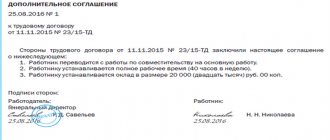Legal grounds for dismissal
An employer, when dismissing employees due to illness that prevents them from working at the enterprise, must rely on the regulatory framework.
Violation of the Labor Code of the Russian Federation can lead to disastrous consequences. There are several articles of the Labor Code of the Russian Federation that are suitable for termination of employment relations based on health indicators. Moreover, the initiative to quit can come from both management and the employee himself:
- 5, paragraph 83 of Article of the Labor Code of the Russian Federation - a subordinate can no longer work due to illness - management will need to submit documents from a medical institution confirming that the person is not able to work;
- Clause 8, Article 77 of the Labor Code of the Russian Federation - a subordinate, due to illness, cannot agree with the new working conditions offered by the employer and, due to the impossibility of remaining at the same job, is forced to resign for health reasons;
- Clause 3 (A) of Article 83 of the Labor Code of the Russian Federation – dismissal of an employee for health reasons due to the fact that this fact does not allow him to fully perform his work.
In addition to the Labor Code (and not all of its articles regulating this area of labor relations are touched upon above), the employer must rely on other norms of modern legislation. These include:
- Article 5 of the Administrative Code;
- Constitution of the Russian Federation;
- Laws on the protection of workers' rights and their health;
- Supreme Court judgment issued in 2004.
In cases of non-compliance with the provisions of regulations, an employer who dismisses an employee due to health problems may be held liable.
Refusal to transfer to another job due to illness
How to fire an employee if, based on a medical report, he can no longer continue to work in the same place where he was before? In this case, dismissal for medical reasons is possible only in the following cases:
- the employee did not agree to transfer to another proposed workplace that suited him for medical reasons;
- the employer cannot offer the subordinate anything that would suit him in accordance with his position.
This provision of the law applies in cases where the need for a transfer is temporary or permanent (in the case of a temporary option, a transfer for more than four months is considered). The proposed new position may correspond to the previous one in terms of employee qualifications and remuneration. Or it could be worse (lower position, lower salary, etc.). In this case, legislation primarily looks at the safety of human health and life, and not at prestige and material well-being.
The procedure for transferring from one position to another must be recorded in writing.
The subordinate must be presented with a document with an offer to move to a more suitable workplace. In this document, the person leaves his resolution - whether he agrees or not with the employer’s proposal. After a subordinate refuses to transfer, a dismissal order must be issued (this must also be read and signed). A corresponding entry is made in the work book (dismissed “on what date” according to Article 77, Part 8 of the Labor Code of the Russian Federation).
In what cases can you dismiss an employee for health reasons?
It is necessary to distinguish between two concepts: “state of health” and “incompetence”. Incompetence is a discrepancy between the professional qualities of an employee and his position. If a person is fired for health reasons, then it is incorrect to indicate professional incompetence. If a person is fired for health reasons, then he is not required to work for 2 weeks.
Employees can be fired for health reasons in the following cases:
- his state of health does not allow him to perform his work in whole or in part, or working conditions harm his health or aggravate his illness;
- the employee’s health status jeopardizes the life and health of other employees;
- the employee refused the offered position;
- lack of vacancies that would correspond to the employee’s health status;
- the employee resigns of his own free will.
https://youtu.be/gva71cIyBTQ
Dismissal procedure
So, dismissal for health reasons, which does not contradict modern laws on the protection of workers’ rights, is possible in a number of cases:
- As a result of the examination, the employees of the medical institution rendered a verdict regarding the dismissed person - completely unfit for work (incapacitated);
- if health problems are so great that a person cannot work in his previous place and does not want to move to another position;
- if poor health can harm both the employee and his colleagues in the process of performing their job duties (threat to health/life, harm to production).
If an employee quits on his own initiative, citing the presence of an illness incompatible with work as the reason, he does not need to work for two weeks. An unsubstantiated statement about illness will not do. The employee will need to document all his words. To do this, you must obtain a medical commission's opinion. When an employee wants to quit, the procedure is standard. In the event of termination of an employment contract at the initiative of the employer, the dismissal procedure has certain features.
Offer another job
After the subordinate has provided his boss with confirmation from a medical organization about his illness, management will have to make a decision.
If there are positions in the organization according to the staffing table that are suitable for the “sick” person, the manager is obliged to offer a transfer to this job. Even if the subordinate loses his salary. The offer is made in writing. Consent/disagreement must also be written.
Employee refusal to transfer
Options for positions for lighter work should be prepared by the HR department. The subordinate gets acquainted with the proposed options. If nothing suits him, then the person can be fired under the appropriate article. It is better to receive the employee’s refusal in writing or draw up a statement of refusal in the presence of witnesses. Provided that the employee has temporary health problems and he will be able to start work no later than in 4 months, then there is no need to dismiss such an employee. He can simply be sent on “rest”, but at the same time the person retains his job.
The notification of vacant positions/job offer must be issued in two copies. One of them must remain with the employee, the other is transferred to the manager with a note of agreement/disagreement. If there are no suitable vacancies, the “patient” must also be informed of this situation in writing.
Order of dismissal
This document is drawn up in the organization and registered in accordance with the accepted document flow. The contents of the order indicate information about:
- enterprise;
- manager;
- being fired;
- reason for dismissal.
At the end, signatures are placed with a transcript of the interested parties.
In the case of temporary suspension from a position due to the fact that a person is sick, the order indicates the period of time for which the employee is suspended.
Entry into the work book
A mandatory entry about dismissal is made in the work book and the article of the Labor Code in accordance with which the contract is terminated is indicated. This means that an entry must be made in the work book that the person was fired due to deteriorating health.
Payment of wages and compensation for unused vacation
Like other categories of employees, when dismissing a worker who is unable to work for health reasons, the employer is obliged to pay wages (in full for the entire period worked).
In addition, compensation for unused vacation days is required. It is paid for all unused vacations; accordingly, if the employee’s additional vacation days are not used, compensation for them is also subject to payment.
Vacation compensation is calculated using the following formula:
Number of unused vacation days × average daily earnings.
To calculate the number of unused vacation days, you need to divide the number of allotted days (28 as a general rule) by 12 months and multiply by the difference between the number of months actually worked and the number of vacation days used.
Payment of all amounts must be made on the day of dismissal. If there is a dispute between the employee and the employer about exactly what amount should be paid, then the employee is given an undisputed amount.
Payments upon dismissal
Any dismissal is always accompanied by payment of funds:
- earned money (salary);
- vacation not taken – monetary compensation;
- other payments due to various categories of employees.
In case of loss of work due to illness, an additional benefit is paid - the average salary for two weeks.
In the event of loss of ability to work during the performance of his job duties, excluding the negligence of the employee himself, compensation of average earnings from the employer must continue until his full recovery.
Responsibility for allowing an employee to perform unacceptable work
An employee must be removed from work that is unsuitable for him on the same day he submits the appropriate medical report. If the employer allows him to work in the presence of medical contraindications, then he can be fined for this (Part 3 of Article 5.27.1 of the Code of Administrative Offenses of the Russian Federation):
Articles on the topic (click to view)
- What to do and where to go if you are not paid upon dismissal
- What to do if you are laid off at work
- What to do if the employer does not want to fire at his own request
- What to do if the date of the dismissal order is later than the date of dismissal
- What to do if the employer does not give the work book after dismissal
- What to do if you didn’t work officially, you were fired, you didn’t get paid
- What is the employer obliged to give the employee on the day of dismissal?
Therefore, it is better to deal with the transfer of an employee or dismissal for health reasons as soon as possible.
Features of the dismissal of military personnel
Dismissal from military service due to a discovered disease has its own characteristics. The main one is the possibility of leaving only at the request of the serviceman himself. Health limitations are not a reason for dismissal of a serviceman at the request of a superior in rank/rank. When a contract with a serviceman is terminated, he is transferred to the reserve. Previously, the serviceman must be notified of his rights and capabilities:
- information about the period of time during which documents will be prepared for submission for transfer to the reserve;
- the opportunity to express wishes for work and future life;
- information about benefits and preferential opportunities for military personnel in the reserve;
- information about the military registration and enlistment office where you will need to register, etc.
Payments for military personnel will also differ from payments for civilians:
- monetary allowance - until the end of military duty;
- allowance - once after transfer to the reserve - two salaries for those who served for less than twenty years, seven salaries for those who served more;
- bonus for excellence during the performance of their duties up to 25% of the assigned salary at the discretion of the commander.
If an injury occurs at work, compensation will be received in the amount of two million rubles for contract workers and one million rubles for conscripts.
In what cases it is impossible to dismiss an employee for health reasons?
You cannot fire an employee in the following cases:
- there is no medical report about the employee’s loss of ability to work;
- the organization has a vacancy that suits the employee due to health reasons and the employee agrees to take it;
- the employee’s condition is deteriorating and he plans to go on sick leave;
- the employee is pregnant;
- the employee is retired;
- the employee is a military personnel;
- The employee is a single mother.












